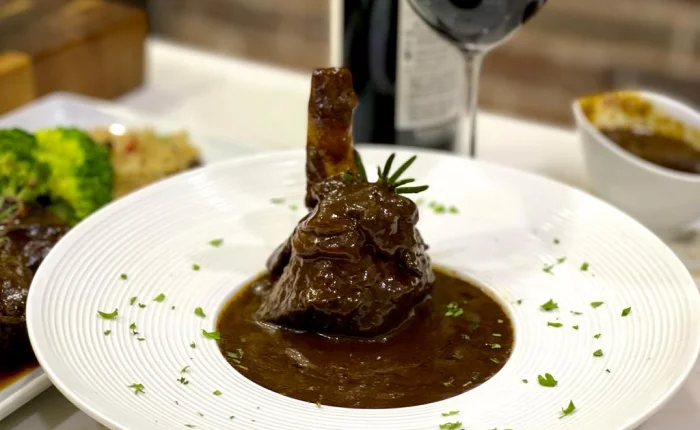
This course is designed to provide a broad understanding of global culinary diversity, allowing you to appreciate and create dishes from various cultures. It’s an excellent opportunity to expand your culinary repertoire and develop a more inclusive and diverse approach to cooking.
Duration: 10 classes (for 5 weeks)
Tuesday 10am – 2pm
Friday 10am – 2pm
Course Fee: N450k
Registration fee: N20k
Includes starter kit and all necessary food ingredients for the duration of the course.
Course Outline
1. Global Culinary Basics
- Introduction to Various Cooking Techniques
- Understanding Ingredients Used in International Cuisines
2. Regional Cuisine Exploration
- Italian Cuisine
- French Cuisine
- Asian Cuisine
- Middle Eastern Cuisine
- Latin American Cuisine
- Others (based on popular demand or requests)
3. Flavor Profiles
- Identifying Unique Flavor Profiles
- Spice Combinations in Different Cultures
4. Culinary Techniques
- Hands-on Learning of Cooking Methods
- Techniques Relevant to International Cuisines
5. Ingredient Diversity
- Exploring Global Ingredients
- Study of Spices, Herbs, and Unique Local Produce
6. Cultural Context
- Understanding Cultural and Historical Influences
- Impact on Culinary Traditions
7. Menu Planning
- Creating Well-Balanced and Authentic International Menus
- Considering Cultural Significance and Pairing
8. Hands-On Cooking
- Practical Cooking Sessions to Apply Classroom Knowledge
- Guidance from Instructors on Techniques and Recipes
9. Adaptation and Fusion
- Exploring Evolution and Adaptation of Cuisines
- Concepts of Fusion Cooking and Cross-Cultural Influences
10. Food Presentation
- Techniques for Presenting International Dishes
- Emphasis on Authenticity and Aesthetics
11. Sustainability and Ethical Practices
- Discussion on Global Culinary Practices
- Considerations for Sustainable and Ethical Food Sourcing
12. Dietary Restrictions and Allergies
- Understanding Common Dietary Restrictions
- Strategies for Accommodating Various Dietary Needs
International cuisine course

International cuisine course
This course is designed to provide a broad understanding of global culinary diversity, allowing you to appreciate and create dishes from various cultures. It’s an excellent opportunity to expand your culinary repertoire and develop a more inclusive and diverse approach to cooking.
Duration: 10 classes (for 5 weeks)
Tuesday 10am – 2pm
Friday 10am – 2pm
Course Fee: N450k
Registration fee: N20k
Includes starter kit and all necessary food ingredients for the duration of the course.
Course Outline
1. Global Culinary Basics
- Introduction to Various Cooking Techniques
- Understanding Ingredients Used in International Cuisines
2. Regional Cuisine Exploration
- Italian Cuisine
- French Cuisine
- Asian Cuisine
- Middle Eastern Cuisine
- Latin American Cuisine
- Others (based on popular demand or requests)
3. Flavor Profiles
- Identifying Unique Flavor Profiles
- Spice Combinations in Different Cultures
4. Culinary Techniques
- Hands-on Learning of Cooking Methods
- Techniques Relevant to International Cuisines
5. Ingredient Diversity
- Exploring Global Ingredients
- Study of Spices, Herbs, and Unique Local Produce
6. Cultural Context
- Understanding Cultural and Historical Influences
- Impact on Culinary Traditions
7. Menu Planning
- Creating Well-Balanced and Authentic International Menus
- Considering Cultural Significance and Pairing
8. Hands-On Cooking
- Practical Cooking Sessions to Apply Classroom Knowledge
- Guidance from Instructors on Techniques and Recipes
9. Adaptation and Fusion
- Exploring Evolution and Adaptation of Cuisines
- Concepts of Fusion Cooking and Cross-Cultural Influences
10. Food Presentation
- Techniques for Presenting International Dishes
- Emphasis on Authenticity and Aesthetics
11. Sustainability and Ethical Practices
- Discussion on Global Culinary Practices
- Considerations for Sustainable and Ethical Food Sourcing
12. Dietary Restrictions and Allergies
- Understanding Common Dietary Restrictions
- Strategies for Accommodating Various Dietary Needs